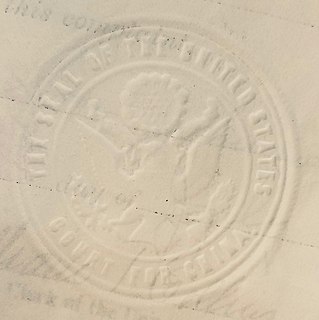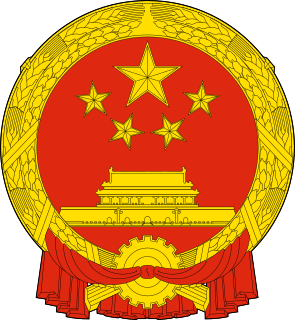Copyright is a type of intellectual property that grants the creator of an original creative work the exclusive legal right to determine whether and under what conditions it may be copied and used by others, usually for a limited term of years. Copyright is intended to protect the original expression of an idea in the form of a creative work, but not the idea itself. A copyright is subject to limitations based on public interest considerations, such as the fair use doctrine in the United States.
Extraterritoriality is the state of being exempted from the jurisdiction of local law, usually as the result of diplomatic negotiations.
A trademark attorney or trade mark attorney or agent is a person who is qualified to act in matters involving trademark law and practice and provide legal advice on trade mark and design matters.

The Supreme People's Court is the highest level of court in the mainland area of the People's Republic of China. Hong Kong and Macau, as special administrative regions, have their own separate judicial systems based on British common law traditions and Portuguese civil-law traditions respectively, and are out of the jurisdiction of the Supreme People's Court.
Intellectual property rights (IPRs) have been acknowledged and protected in China since the 1980s. China has acceded to the major international conventions on protection of rights to intellectual property. Domestically, protection of intellectual property law has also been established by government legislation, administrative regulations, and decrees in the areas of trademark, copyright, and patent. This has led to the creation of a comprehensive legal framework to protect both local and foreign intellectual property. Despite this, copyright violations are common in the PRC, The American Chamber of Commerce in China surveyed over 500 of its members doing business in China regarding IPR for its 2016 China Business Climate Survey Report, and found that IPR enforcement is improving, but significant challenges still remain. The results show that the laws in place exceed their actual enforcement, with patent protection receiving the highest approval rate, while protection of trade secrets lags far behind.
The United States Senate Health Subcommittee on Employment and Workplace Safety is one of the three subcommittees within the Senate Committee on Health, Education, Labor and Pensions.
In the legal system of Courts of England and Wales, the Intellectual Property Enterprise Court in London is an alternative venue to the High Court for bringing legal actions involving intellectual property matters such as patents, registered designs, trade marks, unregistered design rights and copyright. Hearings are usually conducted in the Thomas More Building at the Royal Courts of Justice site in the Strand or at the Rolls Building, Fetter Lane

Tokyo High Court is a high court in Kasumigaseki, Chiyoda, Tokyo, Japan. The Intellectual Property High Court is a special branch of Tokyo High Court. Japan has eight high courts: Tokyo, Osaka, Nagoya, Hiroshima, Fukuoka, Sendai, Sapporo, and Takamatsu. Each court has jurisdiction over one of eight territories in the country. Each has a president and several high court judges. Typically three judges will sit to hear a case, though in some cases - such as ones related to insurrection - five judges will sit.

The United States Court for China was a United States district court that had extraterritorial jurisdiction over U.S. citizens in China. It existed from 1906 to 1943 and had jurisdiction in civil and criminal matters, with appeals taken to the U.S. Court of Appeals for the Ninth Circuit in San Francisco.

The judicial branch, organized under the constitution and law, is one of five organs of power elected by the People's Congress, in the People's Republic of China.

A trademark is a type of intellectual property consisting of a recognizable sign, design, or expression which identifies products or services of a particular source from those of others, although trademarks used to identify services are usually called service marks. The trademark owner can be an individual, business organization, or any legal entity. A trademark may be located on a package, a label, a voucher, or on the product itself. For the sake of corporate identity, trademarks are often displayed on company buildings. It is legally recognized as a type of intellectual property.
A patent court is a court specializing in patent law, or having substantially exclusive jurisdiction over patent law issues. In some systems, such courts also have jurisdiction over other areas of intellectual property law, such as copyright and trademark.

The High Court of Justice in England is, together with the Court of Appeal and the Crown Court, one of the Senior Courts of England and Wales. Its name is abbreviated as EWHC for legal citation purposes.
Dentons Rodyk & Davidson LLP is Singapore's fourth largest law firm by headcount, with over 230 lawyers who are qualified in various jurisdictions such as those of Singapore, Australia, England and Wales and India, and with offices in Singapore and Myanmar. It traces its beginnings to the partnership of Woods & Davidson, founded by Robert Carr Woods and James Guthrie Davidson in 1861. After the death of Woods, Bernard Rodyk joined Davidson in 1877. The firm was renamed Rodyk & Davidson.
The House Judiciary Subcommittee on Courts, Intellectual Property and the Internet is a subcommittee within the House Judiciary Committee. It was established in 2011.

The British Supreme Court for China was a court established in the Shanghai International Settlement to try cases against British subjects in China, Japan and Korea under the principles of extraterritoriality.

The Swiss Federal Patent Court is a Swiss federal court competent for particular legal matters, such as patent cases. It has its seat in Sankt Gallen, Switzerland.
Anti Monopoly Law of China refers to the Anti-Monopoly Law of the People’s Republic of China, passed by the National People’s Congress on 30 August 2007, and implemented as of 1 August 2008.

The Beijing Intellectual Property Court is a Court of special jurisdiction in the People's Republic of China, which handles: "first-instance IP civil or administrative cases with professional features involving patents, new varieties of plants, layout design of integrated circuit, know-how and so on." There are similar courts based in Shanghai and Guangzhou.








